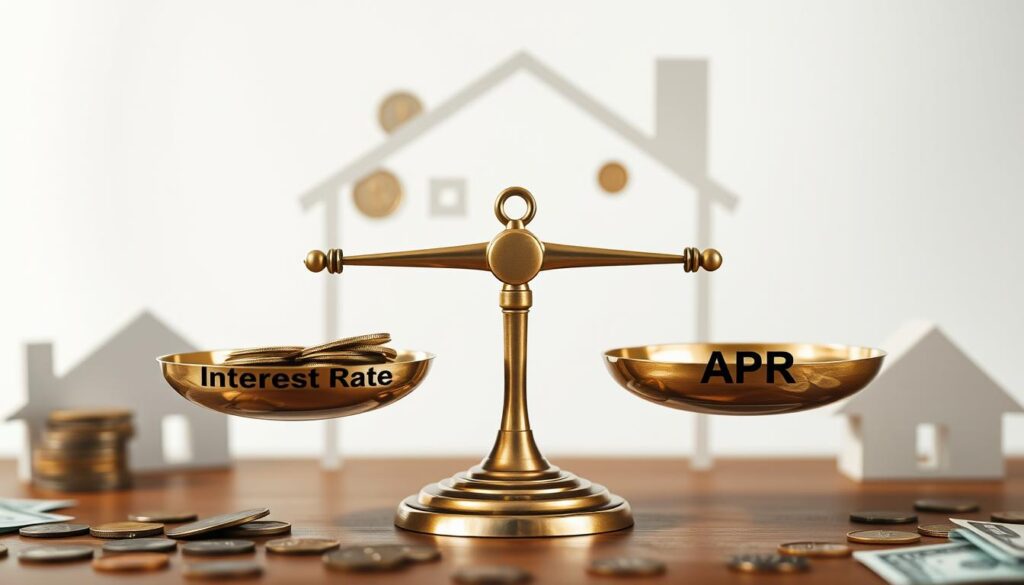Getting a low interest home loan can really help homeowners. Mortgage rates have changed a lot, especially during the pandemic. Now, many are deciding if it’s worth moving to a bigger house to keep a low interest rate.
Even rates of 3-5% are considered low by history. Rates above 7% were common for nearly 60% of the time since 1971.
Choosing to buy a home or refinance is a big decision. The lowest interest rate might not always be the best deal. Things like the loan amount, down payment, credit score, and fees can change the loan’s true cost.
Homeowners need to think about their finances and talk to a mortgage expert. They should decide if it’s better to move up, invest in a rental, or just fix up their current home.
Key Takeaways
- Securing a low interest home loan can provide significant savings over the life of the loan.
- Mortgage rates have fluctuated, with historically low levels during the pandemic, leading to difficult decisions for homeowners.
- Factors like loan amount, down payment, credit score, and fees can impact the true cost of the loan, as reflected in the APR.
- Homeowners should carefully evaluate their financial situation and work with a mortgage professional to determine the best course of action.
- Low interest rates can enable homeowners to upgrade their property, invest in rental properties, or renovate their current home.
Understanding Mortgage Interest Rates
Mortgage interest rates are key in the home buying process. They affect the total cost of a home loan. The rate is based on several factors.
Factors Affecting Interest Rates
Several things influence mortgage interest rates:
- Home price and loan amount
- Down payment size
- Loan term (e.g., 15-year, 20-year, 30-year)
- Interest rate type (fixed or adjustable)
- Loan type (conventional, FHA, etc.)
- Borrower’s credit score
Interest rates are important, but not the only thing to consider. The annual percentage rate (APR) is also key. It includes the interest rate and other fees like origination fees and closing costs.
| Loan Type | Mortgage Interest Rate | APR |
|---|---|---|
| 30-year fixed-rate mortgage | 6.5% | 6.8% |
| 5/1 adjustable-rate mortgage | 6% | 6.5% |
| Jumbo mortgage loan | 6.75% | 7% |
Understanding the APR is crucial. Compare it across lenders to find the best deal, not just the lowest rate.
The Difference Between Interest Rate and APR

When looking at home loans, knowing the difference between interest rate and annual percentage rate (APR) is key. The interest rate is what you pay to borrow money. The APR includes the interest rate plus extra fees and costs of the loan.
The APR must be shown in any loan agreement and ads for loans with interest rates. If an ad shows a low interest rate but doesn’t mention the APR, be careful. The APR shows the real cost of the loan. It can affect your monthly payment, even if the interest rate seems low.
- The interest rate is the percentage of the loan amount you pay back to the lender.
- The APR includes the interest rate and other costs of getting the loan. It gives a clearer view of the loan’s total cost.
- The APR is usually higher than the interest rate because it includes extra fees like prepaid interest, mortgage insurance, and closing costs.
It’s important to know the difference between interest rate and APR when choosing a home loan. By looking at the APR, you can understand the loan’s total cost better. This helps you make a smarter choice.
“Comparing lenders is crucial to secure a better APR, as different lenders may offer varying origination costs and fees.”
When checking out home loan options, always look at both the interest rate and APR. This ensures you get the best deal for your financial situation.
Taking Advantage of Low Interest Home Loan

Homeowners today have great chances to use their home equity wisely. They can refinance and get a home equity loan or line of credit. This way, they can fund home improvements without getting a new mortgage.
Another smart move is to buy a more expensive home. With fixed-rate loans, monthly payments stay low. Since 2011, mortgage rates have been lower than before, making 30-year loans often better than 15-year ones.
Options for Homeowners

Low interest rates also open doors for investment properties. Homeowners can earn passive income from vacation homes or rentals. Rental rates tend to go up over time, making it a good long-term investment.
First-time buyers can look into new neighborhoods or areas with foreclosures. These areas might see value increases. But, it’s important to research well and seek professional advice before buying.
| Metric | Value |
|---|---|
| Mortgage Rates (Historical Averages) | 7% or higher nearly 60% of the time since 1971 |
| Mortgage Rates (Pandemic Lows) | Mortgage rates of 3% and lower during the pandemic were considered a historical anomaly |
| Mortgage Rates (Current Ranges) | Mortgage rates in the 3-5% range are low by historical standards |
| Monthly Payment Difference (2.75% vs. 5.75%) | An extra $700 per month ($8,400 per year) |
While low interest rates offer many chances, homeowners must be careful. They should think about their finances and seek advice. This is especially true when trying to make big gains.
Conclusion
Choosing a low interest home loan can greatly benefit homeowners. However, deciding to move to a bigger home while giving up a very low mortgage rate is tough. It’s key to know what affects mortgage interest rates.
Things like home price, loan amount, down payment, and credit score matter. Also, the difference between the interest rate and the annual percentage rate (APR) is important. The APR shows the loan’s true cost.
Homeowners can use low interest rates in several ways. They can refinance, move to a pricier home, invest in real estate, or explore new neighborhoods. But, it’s vital to check your finances and talk to a mortgage expert.
They can help find the best low interest home loan for you. This way, you can save money and have more flexibility in your home financing.
By understanding mortgage interest rates and using low rate chances, you can save a lot. Weighing factors, comparing APRs, and looking at different options helps. This way, you can make choices that fit your financial goals and get the most from a low interest home loan.
FAQs
Q: What are the advantages of choosing a low interest home loan?
A: Choosing a low interest home loan can significantly reduce your monthly mortgage payment, allowing you to allocate funds to other expenses or savings. It also decreases the overall interest you’ll pay over the life of the loan, making homeownership more affordable.
Q: How can I compare current mortgage rates?
A: To compare current mortgage rates, you can use online tools like Zillow or visit various mortgage lender websites. It’s important to compare mortgage rates by loan type, such as 15-year fixed versus 30-year fixed options, to find the best fit for your financial situation.
Q: What factors influence mortgage rate trends?
A: Mortgage rate trends are influenced by various factors including inflation, the Federal Reserve’s monetary policy, and the overall economic environment. Keeping an eye on these factors can help you better understand when to lock in a lower interest rate on your mortgage.
Q: How do I get the best mortgage for my situation?
A: To get the best mortgage, you should apply for mortgage preapproval with multiple lenders, compare current mortgage rates, and consider different loan programs. Additionally, having a good credit score can help you secure the lowest mortgage rate available.
Q: What is the difference between a 30-year fixed and a 15-year fixed mortgage?
A: A 30-year fixed mortgage offers lower monthly payments spread over a longer loan term, while a 15-year fixed mortgage has higher monthly payments but allows you to pay off your loan faster and with less interest overall. Your choice will depend on your financial goals.
Q: How often do mortgage rates change?
A: Mortgage rates change daily based on market conditions, so it’s essential to stay updated on the current average rates. By doing so, you can take advantage of lower rates when they become available and lock in your mortgage rate.
Q: How can I find the lowest mortgage rate?
A: To find the lowest mortgage rate, you should compare mortgage rates from at least three different lenders, look for mortgage points that can lower your rate, and ensure you understand the terms of different loan offers. This will help you make an informed decision.
Q: What does a mortgage rate lock mean for my loan?
A: A mortgage rate lock is an agreement between you and the lender that guarantees a specific interest rate for a set period. This means that even if mortgage rates change, your rate will remain the same until your loan closes, which can help you save money if rates are expected to rise.
Q: What is a loan estimate and why is it important?
A: A loan estimate is a document provided by a mortgage lender that outlines the terms of your mortgage, including interest rates, monthly payments, and closing costs. It is important because it allows you to compare different loan offers and understand the total cost of the loan before you commit.
Q: Why should I consider multiple lenders when applying for a mortgage?
A: Considering multiple lenders allows you to compare current mortgage rates and loan programs, which can help you secure a lower interest rate and better loan terms. Different lenders may offer varying rates and fees, so shopping around is crucial to find the best mortgage.
Source Links
- https://www.investopedia.com/articles/personal-finance/042015/comparison-30year-vs-15year-mortgage.asp
- https://www.rocketmortgage.com/learn/15-vs-30-year-mortgage
- https://www.investopedia.com/mortgage/mortgage-rates/how-it-works/
- https://www.bankrate.com/mortgages/what-is-a-mortgage-interest-rate/
- https://www.rocketmortgage.com/learn/how-does-mortgage-interest-work
- https://www.bankofamerica.com/mortgage/learn/apr-vs-interest-rate/
- https://www.rocketmortgage.com/learn/comparing-mortgage-options-apr-vs-interest-rate
- https://www.bankrate.com/mortgages/apr-and-interest-rate/
- https://www.usbank.com/financialiq/manage-your-household/home-ownership/How-you-can-take-advantage-of-low-mortgage-rates.html
- https://awealthofcommonsense.com/2022/08/the-cost-benefit-of-giving-up-a-low-mortgage-for-a-new-house/
- https://www.churchillmortgage.com/articles/low-interest-rate
- https://www.mhslending.com/blog/2023-07/impact-interest-rates-your-home-loan-options-tough-market
- https://www.investopedia.com/mortgage/mortgage-rates/factors-affect-mortgage-rates/
